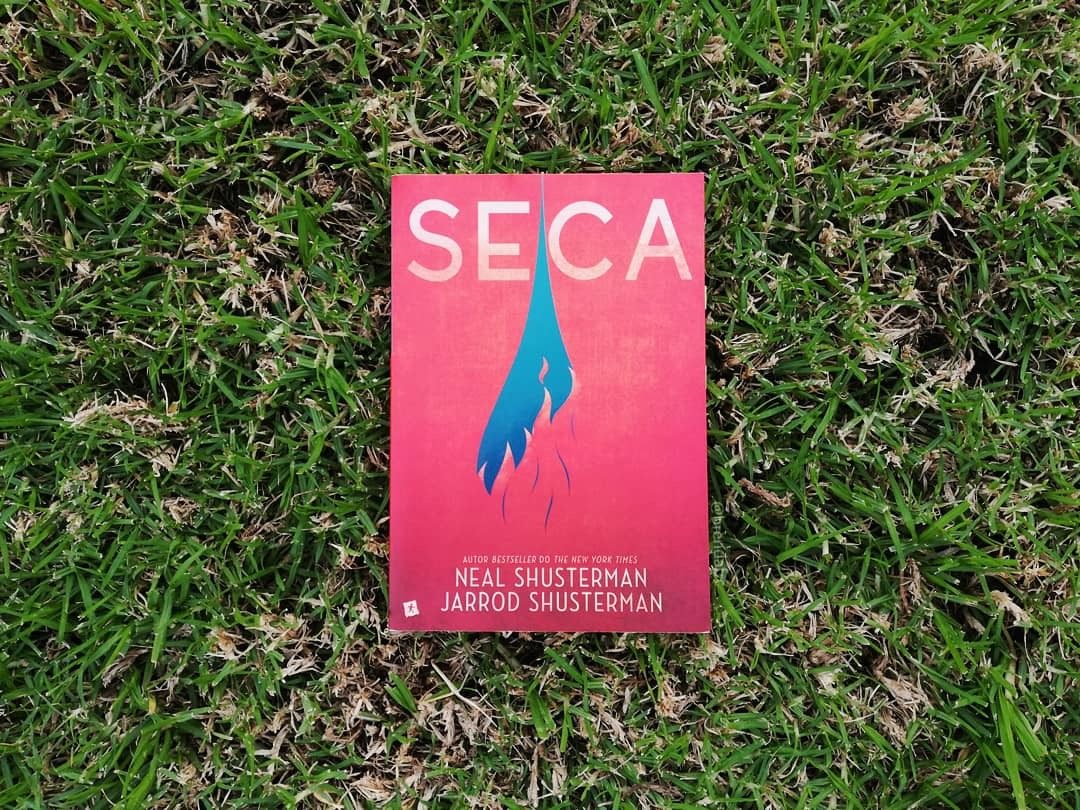O livro Seca, escrito por Neal Shusterman e Jarrod Shusterman, apresenta-nos uma sociedade severamente afetada pela seca em que um dia ocorre um "fechar da torneira", isto é, acaba-se a água no abastecimento público.
Com o desaparecimento dos pais durante esta crise, Alyssa e o irmão, junto com o vizinho Kelton, tentam lidar com esta grave mudança da forma mais humana possível.
Este livro é o perfeito exemplo do que irá acontecer quando um dos bens mais essenciais, a água, acabar.
Imagina abrir a torneira e não sair água. Desesperante, não é?
Na recente onda de consciencialização e ativismo pelas alterações climáticas é urgente perceber as implicações de tudo o que poderá acontecer caso a situação se torne (ainda) mais crítica.
Já imaginaste o que pode acontecer caso não haja água? Não podes saciar a tua sede, não podes utilizar a casa de banho, mal podes cozinhar. E se uma mãe não bebe água como poderá amamentar um bebé, como é que um bebé poderá beber leite em pó se não há água para lhe juntar?
Abres a torneira e não sai água. Vais ao supermercado e não há nada que possas comprar para matar a tua sede. Nunca te aconteceu estares com sede, mas estás num local do qual não podes sair e não levaste garrafa de água contigo? Não te dá ainda mais sede o facto de saberes que não tens como a saciar?
Imagina agora que a água potável efetivamente acaba e esta situação pode ser a tua realidade um dia...?
Ao leres este livro vais dar por ti numa agonia constante do "e se for eu a ter que passar por isso?" e "e se um dia isto realmente acontecer". Aqui a chave parece ser o "e se acontecer enquanto eu viver", porque para muita gente, despreocupada com tudo o que tem sido dito sobre as alterações climáticas, é isso que interessa: o seu tempo de vida.
Quem vive sem se preocupar com as consequências das nossas atitudes menos amigas do ambiente está das duas uma: olhando apenas para o seu umbigo e desde que haja fartura para si tudo bem, ou então está claramente em negação. Não falei na desinformação porque com o tanto que se tem falado no assunto quem não sabe é porque não quer e isso cai nestes dois pontos acima mencionados.
Muitas vezes a nossa ligação ao lugar e/ou à comunidade faz-nos desvalorizar ou negar o risco, porque se há segurança e as necessidades estão saciadas que mais se pode querer, não é?
Neste livro as pessoas ignoraram todos os avisos. Quando tudo indicava que a água potável iria acabar, quando eram implementadas medidas cada vez mais severas, quando eram feitos protestos, as pessoas faziam o quê? Ficavam em casa a ver da televisão acreditando que não iria acontecer com elas.
Na realidade está a Greta a dar uma palestra nas Nações Unidas sobre as alterações climáticas e está muita gente a fazer o quê? A falar da síndrome da moça, a falar que ela foi paga para dizer aquilo, a falar que está a ser usada pelos pais para fazer dinheiro, que está a ser falsa no seu discurso, a dizer que as grandes organizações ambientais querem é assustar as pessoas para fazerem mais dinheiro, entre tantas outras coisas.
Há pessoas que falam de tudo do que está à volta do assunto, mas ninguém quer efetivamente tocar "na ferida", e porquê? Faz tudo parte da desvalorização e negação do risco. Porque se nós o ignorarmos significa que ele não está realmente ali, certo? ERRADO!
Eu sei que é mais fácil negar o risco, desvalorizar, mas ele não deixa de lá estar. E não é melhor tentar mitigar as consequências antes que a situação seja irreversível?
Mas lá está, por vezes as pessoas não têm capacidade de sair da ideia daquilo que sempre imaginaram que seria o mundo e o seu futuro, ou não conseguem sair da sua bolha e ver que realmente é preciso ser feito algo, nem que seja para assegurar a sua sobrevivência num futuro não tão breve.
E este livro mostra um pouco esta separação entre os que não se importam e não se preparam e com os que se preparam ao extremo.
Li este livro pouco antes de entregar a dissertação de mestrado e não poderia ter lido este livro em melhor altura porque me deu outra visão, embora ficcional (ainda que eu considere que, infelizmente, será uma realidade pouco distante), do que poderia acontecer no caso de um evento deste tipo ocorrer e de como por vezes a teoria sobre as comunidades unidas nem sempre é tão linear assim. Nós nunca conseguiremos prever como se comportarão membros de uma comunidade unida perante uma situação de completo desespero.
Aconselho que leias este livro com uma garrafa de água (ou outra bebida) por perto, porque vais ficar com uma sede danada.
Classificação: ★★★★★
The book Dry, written by Neal Shusterman and Jarrod Shusterman, introduces us to a severely drought-stricken society where there is a day when there is a "shut-off in the water tap" that is, there's no more water for public supply.
With the disappearance of their parents during this crisis, Alyssa and her brother, along with their neighbor Kelton, try to deal with this serious change in the most humane way possible.
This book is the perfect example of what will happen when one of the most essential goods, water, disappears.
Imagine turning on the water tap and no water coming out. Maddening, isn't it?
With the recent surge of climate change awareness and activism, it is urgent to realize the implications of everything that can happen if this situation becomes (even) more critical.
Have you ever wondered what might happen if there is no water? You can't satiate your thirst, you can't use the bathroom, you can barely cook. And if a mother does not drink water how does she breastfeed her baby, how can a baby drink powdered milk if there is no water to add to it?
You turn on the water tap and no water comes out. You go to the supermarket and there's nothing you can buy to satiate your thirst. It never happened to you to be thirsty, but are you in a place you can't leave and you didn't take a bottle of water with you? Knowing that you have no way to satiate your thirst doesn't it make you even more thirsty?
Now imagine that potable water is effectively running out and this situation may be your reality someday ...?
As you read this book you will find yourself in a constant agony of "What if I have to go through this?" and "what if one day this really happens". Here the key seems to be "what if it happens while I live," because for many people, unconcerned about all of what has been said about climate change, that's what matters: their life time.
Anyone who lives without worrying about the consequences of our less environmentally-friendly attitudes is either one: looking only at his belly and as long as there is plenty for himself he's ok, or else he is clearly in denial. I did not speak of misinformation because there are a lot of daily information about this topic nowadays so if the subject who does not know about this it's because they do not want to know.
Often our connection to the place and/or community causes us to devalue or deny the risk, because if there is security and our needs are satisfied what can we want more?
In this book people ignored all warnings. When it seemed that water would run out, when increasingly severe measures were implemented, when protests were made, people did what? They stayed at home watching television believing it would not happen to them.
In fact, when Greta is giving a lecture at the United Nations about climate change, what is a lot of people doing? Speaking of the girl's syndrome, saying that she was paid to say that, saying she is being used by her parents to make money, being fake in her speech, among so many other things.
There are people who talk about everything around the subject, but no one really wants to touch "the wound" and why? It's all part of the depreciation and denial of the risk. Because if we ignore him it means he's not really there, right? WRONG!
I know it is easier to deny risk, to devalue, but it does not cease to be there. And isn't it better to try to mitigate the consequences before the situation is irreversible?
But there it is, sometimes people don't have the ability to get out of the idea of what they always imagined the world and its future would be, or they can't get out of their bubble and see that something really needs to be done, if only to ensure their survival in a not so short future.
And this book shows a little of this separation between those who do not care and do not prepare and those who prepare themselves to the extreme.
I read this book shortly before I submitted my master's dissertation and could not have read this book in a better time because it gave me another, though fictional (even if I think it will unfortunately be a not so distant reality) insight into what might happen in the future if such an event occurs and how sometimes the theory of united communities is not always so linear. We will never be able to predict how members of a united community will behave in the face of complete despair.
I advise you to read this book with a bottle of water (or another drink) nearby, because you will be sooo thirst.
Rating: ★★★★★












